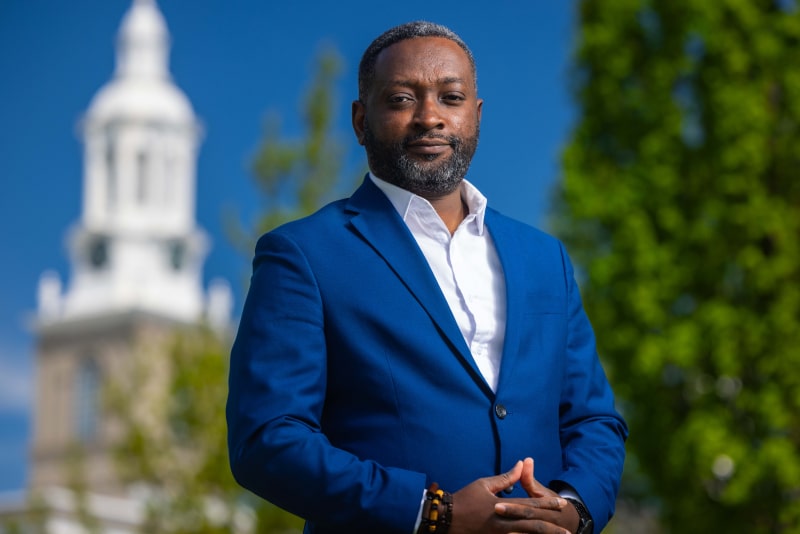Emmanuel Frimpong Boamah named chair of UB’s Department of Urban and Regional Planning

The University at Buffalo School of Architecture and Planning is pleased to announce that Emmanuel Frimpong Boamah has been named chair of the Department of Urban and Regional Planning. He succeeds Lucie Laurian, who has served in that role since 2023.
“I am confident Emmanuel will continue to strengthen this department and further the mission of our School,” says Dean Julia Czerniak. “His consistent, high-level performance in research, engagement with the community and profession, and leadership among faculty and students will ensure we maintain our commitment to excellence.”
Boamah is an associate professor in the Department of Urban and Regional Planning, an affiliated faculty member with UB’s Community for Global Health Equity, and an award-winning educator who has published in some of the world’s leading planning and cross-disciplinary journals. Trained in urban and regional planning and institutional economics, he earned a PhD in Urban and Public Affairs from the University of Louisville. His work seeks to understand and reform the planning processes and institutional structures (laws, norms, values) that impede and “weaponize” planning interventions against historically marginalized communities. Boamah is a faculty affiliate of the Ostrom Workshop (Indiana University) and the UB Food Systems Lab, and recently served as the Raymond Lifchez Endowed Chair and Visiting Professor in the City and Regional Planning Department at UC Berkeley. He also currently advises and works with the World Health Organization’s Urban Health Unit and is the co-director for the PAHO-WHO Collaborating Center at UB. He is an associate editor for the Journal of Planning Education and Research, an editorial board member of the Journal of the American Planning Association, and an international corresponding editor for the Journal of Architecture.
Boamah joined UB in 2017 and has worked in various leadership and service positions at the university, including associate professor, director of graduate studies, and interim chair of the Department of Urban and Regional Planning in 2022. Before joining UB, he was a visiting assistant professor at Minnesota State University’s Urban and Regional Studies Institute. He currently sits on the boards of the Buffalo Niagara Waterkeeper, UB Community Health Equity Research Institute, Providence Farm Collective, and the Center for Regional Strategies.
In this new leadership role, Boamah looks forward to building on the department’s past progress to continue strengthening its academic programs; ensure thoughtful, ethical, and socially just outreach and community partnerships throughout Western New York; and actively hone the department’s curriculum to set the students up for success in today’s world. “We’re prioritizing our commitment to enhancing students’ experiences in our programs by making our curriculum intellectually engaging, exciting, and responsive to the current issues facing us and the communities we serve,” Boamah shared.
He is also eager to continue efforts to bolster collaboration within the department and the school while continually nurturing the growth of its intellectual culture. He explained, “The prospect of working closely with our architecture colleagues to envision a future where planners and architects collaborate to address some of the ‘wicked’ problems of our time is very exciting.”
In the short term, Boamah looks forward to building on the positive relationships that he’s established over the last eight years to help develop a collective understanding among students, staff, and faculty of their aspirations, both individual and collective. He’s confident that this will set the foundation for the long-term translation of that work into a shared vision of success. “It’s about making and celebrating our department and school as a globally renowned, intellectual site for studying and practicing how to co-plan and co-design healthier, just, and inclusive societies.”
Boamah will assume the role of chair starting in July 2025.

 Study Architecture
Study Architecture  ProPEL
ProPEL 